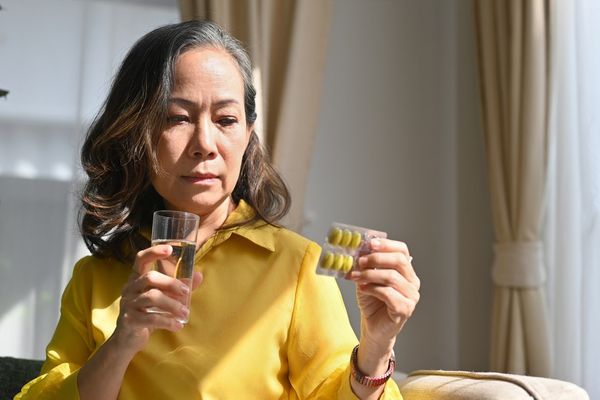At 47, Louisa, a community college adjunct professor, has been struggling with perimenopause symptoms including an erratic menstrual cycle, cramping without bleeding, leg pains and severely sensitive breasts.
"I had to protect them, even in the shower," Louisa said, referring to her breast pain. Though she had already been taking a low-dose contraception pill for birth control, her doctor upped her pill's hormone dosage as a first attempt to combat her perimenopause symptoms. When she spoke to HealthyWomen, Louisa had been on her new regimen for a couple of weeks and said her breast and leg pains haven't come back since she upped her dose.
Healthcare providers are increasingly turning to the birth control pill as a treatment for perimenopause symptoms. Women who don't smoke or experience migraine with aura can safely take the pill into their early 50s, explained Barbara Dehn, a North American Menopause Society (NAMS)-certified nurse practitioner and a member of HealthyWomen's Women's Health Advisory Council.
"[The pill] smooths out that perimenopause transition with its wild, roller coaster swings in hormone levels," Dehn, author of "The Hot Guide to a Cool, Sexy Menopause," explained.
Low risk
The pill's new role in combating perimenopause symptoms is one of the recent evolutions in menopause knowledge and treatment that Dehn is excited about. For too long, Dehn said, women have been forced to make decisions based on fear, not facts, when it comes to menopause and hormone therapy (HT).
Much of the fear stemmed from a study released in 2002 that suggested HT increased the risk of breast cancer and heart attacks in women. However, in the years since the study's release, it's become increasingly clear it led to numerous misconceptions about hormones, and it's now believed that using HT to ease perimenopause/menopause symptoms is low risk for women who are within the first 10 years of their final period and younger than 60.
"A lot of research has been coming out, dispelling that fear and ushering in a new era of thinking about hormones in a much more holistic way," Dehn said. "Using hormone treatment for some women is much more beneficial than risky. If they start using hormones early, when their body is starting to show the symptoms of depletion, they have enormous health benefits in the short and long term."
Dehn said HT is the most effective way to reduce hot flashes and night sweats, improve sleep, and reduce brain fog. It also helps with vaginal dryness, genitourinary symptoms and maintaining bone mass.
Additionally, for women who start HT within the first 10 years from their final period, there seems to be a reduced risk of cardiovascular disease. These short-term benefits improve overall quality of life in the long term. (Women over 60 who've exceeded 10 years from their last period, however, face an increased risk of breast cancer and stroke with HT.)
A study published in the August Journal of The North American Menopause Society also found that younger women who used estrogen-only therapy following ovary removal (oophorectomy) saw a 32% reduction in all-cause mortality over long-term follow-up.
"It is super important, especially for women who've had a surgical menopause or induced menopause to think about using hormones because it may help them live longer," Dehn said.
While induced menopause can be triggered by drug or radiation therapies that damage the ovaries, the most common cause of surgical and induced menopause is the removal of the ovaries, which is frequently combined with a hysterectomy. (A hysterectomy that only removes the uterus does not cause menopause.) Unlike with natural menopause, those who undergo ovary removal begin menopause abruptly on the day of the surgery.
Easing symptoms
There are several different options that can alleviate symptoms of perimenopause and menopause. Dehn is a proponent of bioidentical hormones, which are chemically identical to those your body produces. They include estrogen and progesterone (FDA-approved, well-studied medications available by prescription).
She has patients who worry about taking hormones for menopause symptoms because they're afraid that they're unnatural. "As providers, one myth we hear is that hormones aren't natural. We have to clarify this: Hormones are natural; you have them circulating in your body right now."
Estrogen therapy can also improve vaginal health by reducing the risk of bacterial infections and alleviating vaginal dryness, which can make even wiping painful. Today, Dehn noted, there are a variety of treatment options available.
"There's a general lack of information regarding what women need to thrive both during the menopausal transition and afterwards," Dehn said.
Brain fog
Aside from a better understanding of HT, Dehn said there's now research that helps providers understand why brain fog happens.
"It comes from sleep fragmentation," Dehn said. This happens when the body transitions from deep, restorative sleep to lighter sleep multiple times at night without coming fully awake. "Women may be in bed thinking they're sleeping for eight hours but wake up exhausted and can't function."
Dehn spoke of a patient, who was considering retirement at 48 because she simply couldn't remember things. Dehn discovered her patient was in premature menopause and put her on the birth control pill. "A few months later, she told me 'you gave me my life back,'" Dehn said. "Sleep fragmentation is real. It affects memory and causes brain fog."
As treatments for menopause continue to evolve, it's important for women to talk with their healthcare provider about their symptoms and concerns. Dehn recommends finding a NAMS-certified practitioner — be it a doctor or a nurse practitioner.
"Remember, women may live another 30-50 years after menopause, which is why choices we make early on in menopause have lasting impacts," Dehn said. For anyone experiencing perimenopause or menopause symptoms, Dehn advised, "If you're having a lot of symptoms, don't delay."
*Louisa asked us not to use her last name to protect her privacy.
Resources:
The North American Menopause Society
- Top 10 Menopause Symptoms ›
- 10 Things the Men in Your Life Need to Know About Menopause - HealthyWomen ›
- Menopause and Sleep: What's the Connection? - HealthyWomen ›
- How to Have the Best Sex of Your Life After Menopause - HealthyWomen ›
- Hormone Therapy Saved My Life After Doctors Dismissed My Perimenopause Symptoms - HealthyWomen ›
- Dealing With Rage During the Perimenopause Transition and Beyond - HealthyWomen ›
- Get Good Menopuase Care with the Right Healthcare Provider - HealthyWomen ›
- Menopause Symptoms Are Far from Universal - HealthyWomen ›







